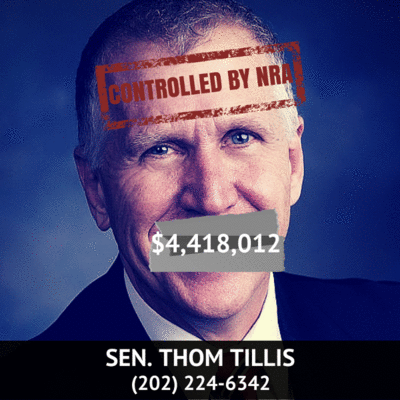Following the worst mass shooting in modern American history, 56 senators blocked critical gun safety measures that would have kept guns out of the hands of people on the terror watch list. #Republicans won’t allow guns at their own National Convention in Cleveland this July, but at the insistence of the #NRA, they’re perfectly fine letting people who have pledged allegiance to #ISIS to buy assault weapons to shatter lives across the country. All in the name of profit.

Reposted from EVERY TOWN FOR GUN SAFETY
Bottom Line: The June 12, 2016 mass shooting at a gay club in Orlando, FL, was not only the deadliest shooting in American history — it was a heinous hate crime and an act of terrorism, perpetrated by a dangerous person who had been under investigation by the FBI for suspected terrorism and never should have had access to a gun. Gun violence in America too often includes hate crimes and acts of terrorism, and hate crimes and terrorist acts on U.S. soil overwhelmingly involve the use of guns. Strengthening our gun laws and closing loopholes in the background check system will help prevent lethal hate crimes and acts of terrorism in the U.S.
- To effectively prevent violent crimes by those who target LGBTQ Americans, as well as those who target certain other communities based on their race or religion, we must prohibit people convicted of violent hate crimes from buying or possessing guns.
- To effectively protect Americans from terrorists who want to attack our way of life, we must give the FBI the authority to block gun sales to suspected terrorists.
- And to enforce the laws designed to keep guns out of the hands of dangerous people, we must require a background check for every gun sale in America.
Hate Crimes and Gun Violence
- Hate crimes in the United States increasingly involve violence, especially hate crimes targeting LGBTQ Americans.
- Data from the National Crime Victimization Survey indicates that between 2010 and 2014, there were an estimated 43,000 hate crimes committed in the United States that involved guns.1
- More than 1 in 3 hate crimes (38 percent) are crimes of violence—including murder, rape, aggravated or simple assault, robbery, or arson. More than half (52 percent) of hate crimes motivated by sexual orientation are violent.2
- Between 2004 and 2012, the percentage of hate crimes involving violence increased from 78 percent to 90 percent.3
- Assaults involving firearms are consistently more deadly than those with other weapons.
- In studies going back decades, assaults involving guns have proven to be five times more likely to end in the death of the victim than those involving knives, and the difference is even greater with high-caliber guns.4
- Congress should pass legislation that would prohibit people convicted of violent hate crimes from buying or possessing guns.
Terrorism in the United States and Gun Violence
- The overwhelming majority of terrorist incidents in the United States, whether perpetrated by followers of al-Qaeda, ISIS, white supremacists, or other extremists, involve guns.
- An analysis by the Southern Poverty Law Center of 63 terrorism incidents on United States soil between 2009 and 2015—including incidents of Islam-inspired terror, antigovernment attacks, white supremacy, and others—found that nearly two-thirds (64 percent) were perpetrated with firearms.
- People on the terror watch lists legally purchased guns over 2,000 times over 11 years—because the FBI had no authority to block those sales.5
- Between 1970 and 2014, terrorism attacks in the U.S. were ten times more likely to result in fatalities when they involve guns than when they do not, according to the Global Terrorism Database (GTD) at the University of Maryland. Non-firearm terrorist attacks resulted in deaths 4 percent of the time, whereas 40 percent of attacks involving firearms resulted in deaths. 6
- The Orlando shooting was the sixth American mass shooting since January 2009 to be investigated by the FBI as an act of terrorism, and the fourth in the last year.
- San Bernardino, CA: On December 2, 2015, Syed Rizwan and his wife, Tashfeen Malik, shot and killed 14 people and injured 21 others at the Inland Regional Center in San Bernardino, California. Malik pledged allegiance to the Islamic State in a Facebook post, and the FBI is treating the planned attack as an act of terrorism.7
- Chattanooga, TN: On July 16, 2015, Muhammad Youssef Abdulazeez shot and killed five people, including two US Marines and a Naval Officer, and shot and injured two others at a recruiting center and US Naval Reserve center. The incident was investigated as an act of terrorism.8
- Charleston, SC: On June 17, 2015, Dylan Roof shot and killed nine people at the Emanuel African Methodist Episcopal Church, one of the oldest and largest black congregations in the South. The incident was investigated as terrorism and as a hate crime.9
- Garland, TX: On May 3, 2015, Elton Simpson and Nadir Hamid Soofi shot and injured one security officer in Garland, Texas, in a planned attack on an event displaying cartoons of the Prophet Muhammad. Simpson had been convicted for lying to federal agents in a terror investigation and FBI had alerted police that he posed a danger.10
- Oak Creek, WI: On August 5, 2012, Michael Wade Page shot and killed six people and shot and injured three others at the Sikh Temple of Oak Creek. The incident was investigated as terrorism and as a hate crime.11
- Fort Hood, TX: On November 5, 2009, 13 people were shot and killed and 30 others were wounded by Major Nidal Hasan. Hasan was able to pass a background check and buy a handgun even though he was under investigation by the FBI for links to terrorism. The FBI agents investigating Hasan were never informed that he was trying to purchase a weapon.12
- Congress should pass legislation that would help stop gun sales to international or domestic terror suspects.
- Bills introduced by Sen. Dianne Feinstein (D-CA) and Rep. Peter King (R-NY) would close the terror gap by enabling DOJ to block gun sales to suspected terrorists, while affording suspects due process of law.13
- The Feinstein/King bill could have blocked gun sales to the Orlando shooter, who was twice placed on a terror watch list in recent years and was investigated by the FBI as a terror suspect, as well as having history of making violent, bigoted threats. 14
